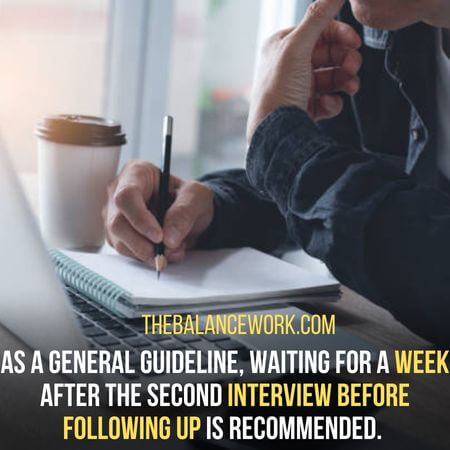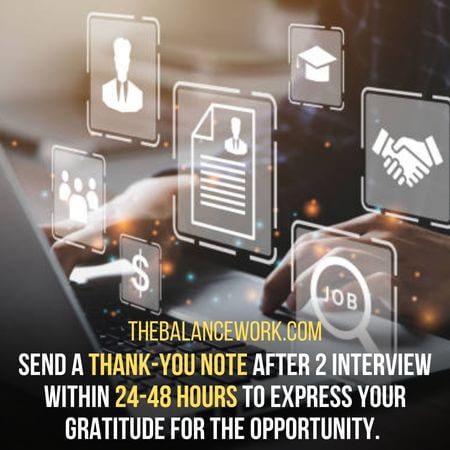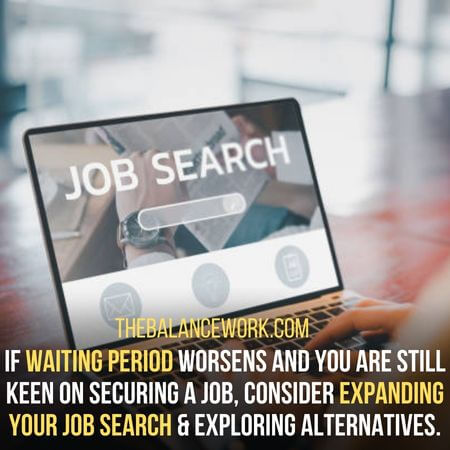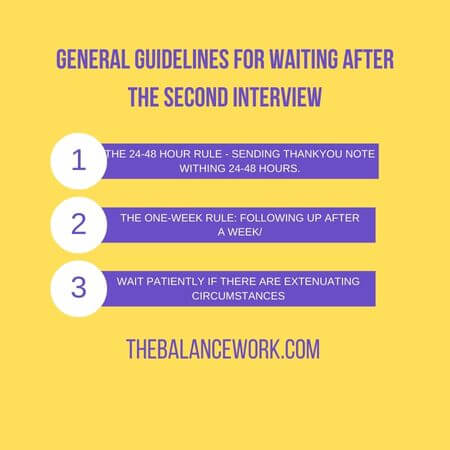How long to wait after second interview? The waiting period can vary depending on the company’s hiring process and communication style.
This allows the company sufficient time to make decisions and complete its internal evaluation.
How Long To Wait After The Second Interview – Factors To Consider In Determining Waiting Time
After completing the second interview for a job, it’s natural to wonder how long you should wait for a response.
Generally, waiting at least a week or two before following up after a second interview is advisable.
The waiting period serves several purposes, such as allowing the company to decide, considering other candidates, and completing their internal hiring process.
When deciding how long to wait after a second interview, it’s important to consider various factors that can influence the timeline.
These factors include the company’s hiring process and communication style.
1. Company’s Hiring Process:
Understanding the typical timeline of the company’s hiring process is crucial.
Some organizations have a structured hiring process with predefined timelines, while others may have a more flexible approach.
Research the company’s hiring practices to understand its timeline and expectations.
However, unexpected delays or unforeseen circumstances may occur, such as changes in the hiring team’s availability or internal reorganizations.
2. Communication From The Company:
Assess how the company communicates with candidates throughout the hiring process.
Pay attention to the clarity of instructions regarding the next steps and any promised timelines or follow–ups mentioned during the second interview.
If the company has provided a specific timeframe for decision-making or mentioned when they will be in touch, consider that as a reference point.
General Guidelines For Waiting After The Second Interview
As a general guideline, waiting for about a week after the second interview before following up is recommended.
This timeframe allows the company ample time to review candidates and make decisions.

However, it’s essential to consider any specific instructions or timelines the company provides.
Additionally, be patient during unexpected delays, as unforeseen circumstances can affect the hiring process.
Balancing persistence with patience is key during this waiting period.
1. The 24-48 Hour Rule:
After the second interview, sending a thank-you note within 24-48 hours is good practice to express your appreciation for the opportunity.
Following this, give the company reasonable time to review and make decisions based on the interviews.
Typically, waiting for at least a few business days allows the hiring team to assess all candidates thoroughly.
2. The One-Week Rule:
If you haven’t received any communication from the company, waiting about a week after the second interview is reasonable.
This allows the company to complete its decision-making process, consider other candidates, and coordinate with all hiring decision-makers.
Remember that schedules can vary, and decision-makers may have other commitments that affect the timeline.
3. Extenuating Circumstances:
While general guidelines exist, it’s important to recognize that certain circumstances can impact the waiting time.
For example, if the company has informed you about a specific delay due to internal changes or unforeseen circumstances.
Then it’s essential to be patient and understanding.
Unusual situations may arise, such as public holidays, company-wide events, or unexpected emergencies, which can cause delays in the hiring process.
Assessing Your Situation And Context
Assessing your situation and context involves reflecting on the interview process, gauging your level of interest, and considering external factors.
Reflect on your performance in the interview and how well you fit the role and company culture.
Evaluate your level of interest in the position and how the waiting period aligns with your expectations.
Additionally, consider external factors such as competing job offers or personal circumstances that may impact your decision-making timeline.
1. Reviewing The Interview Process:
Reflect on the overall interview experience, including your performance and how well you fit the role and the company culture.
Consider how you answered the questions and communicated your qualifications and enthusiasm effectively.
This self-assessment will help you gauge your chances of moving forward in the hiring process.
2. Gauging Your Level of Interest:
Assess your level of interest in the position and company.
Determine if the waiting period aligns with your expectations and your urgency in securing a job.
Consider other opportunities that may be available to you and how they compare to the position you interviewed for.
Balancing your eagerness with patience is important during this stage.
3. Considering External Factors:
External factors can influence your decision-making timeline.
For instance, if you have received other job offers or are actively exploring other opportunities, you may need to decide within a certain timeframe.
Personal circumstances, such as relocation plans or financial considerations, can also affect how long you can wait for a response.
Following Up After The Second Interview
Following up after the second interview is important to stay engaged in the hiring process and demonstrate your continued interest in the position.

Start by sending a thank-you note within 24-48 hours to express your gratitude for the opportunity.
After that, if you haven’t received any communication within the expected timeframe, contacting the company for updates is appropriate.
Choose an appropriate time to follow up, usually after about a week, and politely inquire about the status of the hiring process.
Strike a balance between persistence and patience, demonstrating enthusiasm while respecting the company’s decision-making timeline.
1. Sending A Thank-You Note:
Immediately after the second interview, send a thank-you note to express your gratitude for the opportunity.
This note is a professional gesture and reinforces your interest in the position.
Mention specific aspects of the interview that stood out to you and briefly reiterate your qualifications.
2. Contacting The Company For Updates:
If the expected response time has passed, and you haven’t received any communication from the company, it’s ok to inquire about the hiring process.
Choose an appropriate time to follow up, usually after the one-week mark.
Craft a polite and concise email expressing your continued interest in the position and politely request an update on the status of the hiring process.
3. Balancing Persistence And Patience:
When following up, strike a balance between being proactive and patient.
It’s important to demonstrate your continued interest while understanding that companies need time to make informed decisions.
Avoid being overly pushy or desperate, as it may create a negative impression.
Dealing With Extended Waiting Periods
Dealing with extended waiting periods can be challenging, but managing your expectations and staying proactive is important.
First, be prepared for potential delays in the hiring process and understand that unforeseen circumstances can arise.
During this time, keep your job search active and explore other opportunities to avoid putting all your focus on a single job.
Use the waiting period to enhance your skills, network, or consider additional career options.
Remember to maintain a positive mindset and stay patient, as the right opportunity will come.
1. Managing Expectations:
Be prepared for potential delays in the hiring process, especially if the company has indicated that the decision-making timeline might be longer than usual.
This preparation will help you stay patient and focused during the extended waiting period.
Additionally, keep your job search active during this time, so you don’t miss out on other opportunities that may arise.
1. Seeking Additional Opportunities:
If the waiting period worsens and you are still keen on securing a job, consider expanding your job search and exploring alternative options.

Explore other companies or positions that align with your skills and interests. It’s important not to put all your eggs in one basket and to keep your options open.
Final Decision And Next Steps
After receiving a response from the company, whether an offer or a rejection, it’s essential to handle the situation professionally and make informed decisions.
If you receive an offer, take the time to evaluate it carefully, considering factors such as compensation, benefits, work environment, and growth opportunities.
If necessary, negotiate the terms of the offer to ensure it aligns with your expectations.
Based on your assessment, decide whether to accept or decline the offer.
In the case of a rejection, handle it gracefully, reflect on the experience, and seek feedback for future improvement.

Remember that each step in the hiring process brings you closer to the right opportunity.
1. Receiving An Offer:
If you receive a job offer, take the time to evaluate it carefully. Consider compensation, benefits, work environment, and growth opportunities.
If necessary, negotiate the terms of the offer to ensure it aligns with your expectations and needs.
Finally, decide whether to accept or decline the offer based on your assessment.
2. Receiving A Rejection:
In the unfortunate event of receiving a rejection, handle it gracefully and professionally.
Reflect on the experience and seek feedback if offered, as it can provide valuable insights for future interviews.
Remember that a rejection is not a reflection of your worth as a professional and that the right opportunity will come along.
Conclusion:
Waiting after the second interview requires careful consideration of various factors.
They include the company’s hiring process, communication style, and your situation and preferences.
You can confidently navigate the post-interview period by managing your expectations, following up appropriately, and exploring alternative options if needed.
Remember to stay positive and proactive throughout the process, as the right opportunity will come at the right time.
Last Updated on 1 year by Shahzaib Arshad
- Why Does My Boss Wink At Me? 6 Potential Reasons - October 5, 2023
- Is It Legal For Your Employer To Call Your Doctor? No, But… - October 4, 2023
- 12 Ways To Deal With A Low IQ Person - September 22, 2023